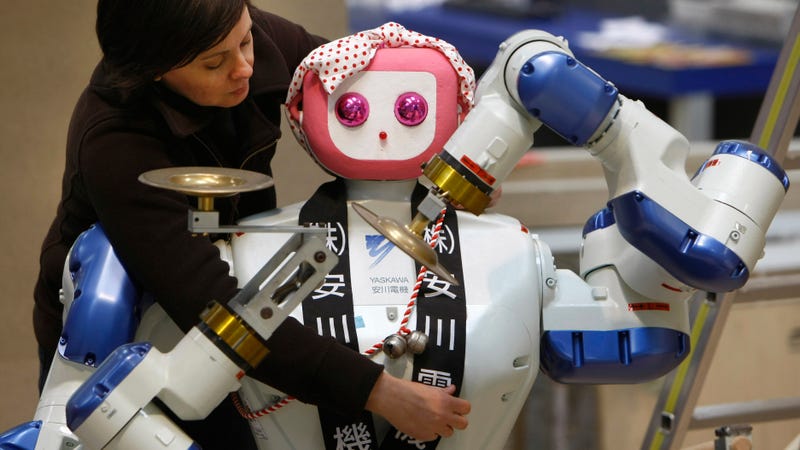 A Yaskawa Electric robot maid at an industrial fair in Hanover, Germany in 2008.Photo: AP
A Yaskawa Electric robot maid at an industrial fair in Hanover, Germany in 2008.Photo: AP
For decades, humans have dreamed of wasting away in their own decadence while armies of robots do everything for them. Yet it turns out that now idle daydreaming is slowly giving way to reality, people are a bit uncomfortable.
According to a new survey of 2,021 adult internet users from the Brookings Institution, the vast majority of people just aren’t all that excited about having a robot help out around the house. Just 20 percent of people said they were interested in obtaining a cleaning robot, while 68 percent said they were not. For more sensitive tasks like security or caring for a child or an aging relative, the numbers were even lower: 17 percent said they were interested in a guard bot (67 percent uninterested) and just nine percent expressed interest in having a robotic caretaker (84 percent uninterested).
This isn’t all that surprising, given that one of the only types of mobile household robot that has achieved widespread adoption—Roomba-style autonomous vacuum cleaners—tend to choke to death as soon as they encounter an obstacle. Better ones are in development, but it’s not clear how well they work outside of demonstration conditions.
And as far as security droids go, they’re mostly still known for alternately face-planting into fountains, harassing toddlers, and ominously reminding the public that they could help usher in a dystopian surveillance state when they get better. (That’s not even counting the terrifying military dog-bots currently under development.) 41 percent told Brookings that they were “very uncomfortable” with robots, while 20 percent said they were “somewhat comfortable.”
“I think the care-taking part is going to take a bit more time for people to be comfortable with,” Brookings Center for Technology and Innovation director Darrell West told Recode.
But the public does expect attitudes to change towards robots as they become more generally useful and move past their uncanny valley phase. 19 percent told Brookings they believed it was “very likely” that in 30 years, robots will be able to “perform most of the activities currently done by humans,” while 33 percent said it was “somewhat likely.” Just 23 percent said it was not very likely. 61 percent of people also said they were not “worried” in the long run about robots, suggesting that maybe their level of discomfort is associated with current models rather than future ones.
Automation is already displacing human labor at a concerning rate, particularly in sectors like manufacturing or the long list of myriad jobs that can be replaced with computers (everything from medical records technicians to loan officers). But when it comes to the home, most people seem fine doing their own dishes for now.
[Recode/Brookings]